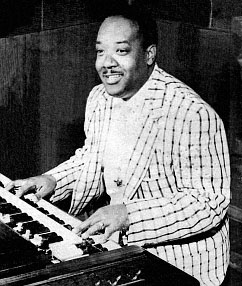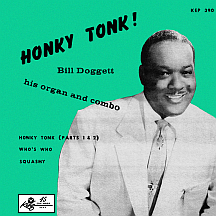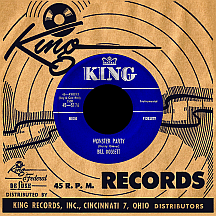BILL DOGGETT
Honky Tonk (Parts 1 and 2)
Evanston, Illinois-born inventor Laurens "Larry" Hammond was granted more than one hundred patents over the course of his lifetime. During the early 1930s he had a popular line of electric clocks, but "timing" wasn't in his favor (money was tight in the Great Depression) and the company struggled. In the mid-1930s he began altering the mechanisms of pianos, experimenting with the different sounds they could make. Eventually an electric organ took shape, an instrument with a sound quite different from the pipe organs of centuries gone by. This keyboard required the use of an amplifier and speakers to control the output of sound, an idea that by the end of the decade had gained in popularity, particularly in churches around the world. Production was halted as a result of World War II, but resumed in the mid-'40s. Over the next few years the exciting sound of the Hammond organ began to impact the world of jazz.
The trumpet was the instrument that struck Philadephia native William Ballard Doggett's fancy, but his family only had a piano and no spare funds for another musical instrument. Starting in 1925, when he was nine, Bill spent the better part of a decade learning to handle the 88 keys in a swing style similar to that of Fats Waller. After high school he played with The Jimmy Gorman Band at the Nixon Grand Theater and later headed the group; Harlem bandleader Lucky Millinder took over the band in 1938 and pianist Doggett remained, outlasting an otherwise entire lineup change two years later. He worked regularly with hitmaking vocal group The Ink Spots from 1942 through '44, arranging many of their recordings during this time. In the mid-'40s he was a member of Johnny Otis's Los Angeles-based band and also worked with Lionel Hampton. In 1949 he temporarily replaced pianist Wild Bill Davis in Louis Jordan's Tympany Five. Davis was an early advocate of the Hammond organ and its application in jazz...soon Doggett was on board with the concept.
Doggett modified his entire style of keyboard playing after falling under the spell of the Hammond B-3. In 1951 he left Jordan to form his own trio with guitarist Billy Butler and drummer Berisford "Shep" Shepherd; that summer the trio backed Ella Fitzgerald in the studio on one of her biggest hits, Arnett Cobb's "Smooth Sailing,"sung entirely in Ella's signature scat style (with help from pop group The Ray Charles Singers). Doggett sat in on other Fitzgerald sides and shortly afterwards signed a contract with King Records. Saxophonist Percy France was added to his combo, which debuted on the label in the spring of '52 with the autobiographically-titled "Big Dog," a two-sider heavy on Bill's impressive mastery of the B-3.

By the end of 1955 King had issued well over a dozen singles of diverse material to minimal interest. Label boss Syd Nathan began pairing Doggett with saxophonist Earl Bostic, a big name since he'd hit number one R&B with "Flamingo" in '51, but even this didn't seem to work. Clifford Scott joined Bill's band, replacing France on sax. The big hit (and I mean big) came as an ongoing group collaboration. During various nightclub shows, they built on a chord progression of Doggett's that seemed to get patrons out on the dance floor; Butler would ad-lib a guitar riff, Scott would improvise a series of notes on the sax and Shepherd would lean on the beat a certain way as "Honky Tonk" took shape. All four musicians received writer credit when the single was released with "Part 1" highlighting Billy's guitar work and "Part 2," the side that garnered the most airplay, placing Clifford's sax solo in the forefront. The single hit the charts in mid-August '56, knocking "Fever" by Little Willie John (also a King act) off the top the the R&B Best Sellers in Stores; on the pop charts Doggett's instrumental peaked at number two (held back by Elvis Presley's "Don't Be Cruel," which displaced it from the R&B summit for a single week in October). Overall, Doggett's hot "Honky Tonk" spent 13 weeks atop the R&B chart...longer than any other record that year. Finally, Bill had a hit at age 40! Not an easy thing to accomplish!
Record sales were much more impressive in the wake of Doggett's two-million-plus smash. A cover of Floridian Sil Austin's sax track "Slow Walk" went top ten R&B and top 40 pop around year's end, though Austin's original was, rightly so, the bigger of the two. A vocal version of "Honky Tonk" featured Tommy Brown (of The Griffin Brothers' band) and was the first of many rerecordings and/or reissues of Bill's signature song. A Millinder tune, "Ram-Bunk-Shush," gave him another hit in early '57, then it was a hit-and-miss situation for a couple of years. A flute-driven remake of Tiny Bradshaw's 1953 sax hit "Soft" returned Doggett to the top 40 in November 1957.
Sweet-toothed sax man Floyd "Candy" Johnson joined the band around 1958 and penned a minor hit, "Blip Blop," followed that fall by "Hold It," a surprise top ten R&B seller that became a standard for many bands including labelmate James Brown, who frequently used it as a transitional number during his stage shows. Doggett charted in late '58 with "Rainbow Riot" and in early '59 with Henry Glover's "Monster Party" (giving mention of filmdom's top pterodactyl - 'Yo man, Rodan!' - in at least one song). Titles were often made up to fit the sound; Doggett's "Yocky Dock" likely had no meaning, but that didn't stop it from getting a little sales action. A cover of Bill Black's huge R&B hit "Smokie - Part 2" siphoned a little airplay from the original at the end of 1959.
Contract negotiations between Doggett and Nathan broke down when Syd's iron fist hit the desk (no raise!) and Bill quit to test the waters elsewhere. Warner Bros. gave him a better deal, but sales were necessary for the contract to pay off. A Butler-Doggett tune, "(Let's Do) The Hully Gully Twist," sought to take advantage of two hot dances at once and made a brief chart appearance around 1961's New Year celebration. For years Nathan milked the Doggett catalogue for all it was worth, putting out older product (sometimes overdubbed or reedited), a practice not merely limited to Doggett but most King acts. A reissue of "Honky Tonk (Part 2)" had a decent chart run during the winter months of 1961. Doggett spent most of '62 and '63 on Columbia's roster working the same formula ("Lady's Choice," "Choo Choo"), then jumped from Sue to ABC-Paramount to Roulette in as many years. Singles and albums continued appearing on King into the early 1970s. For Bill Doggett, his mid-career switch to the Hammond organ served him well. He performed regularly right up until his death in 1996 at age 80.



